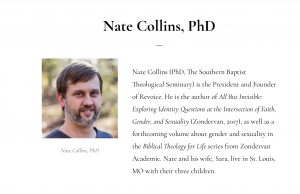Christians have consistently been faced with a choice: either live counter-culturally and face the wrath of those demanding “tolerance,” or accept at face value the demands and claims of a world where sin’s influence runs riot. With the issue of homosexuality, a rapidly growing minority in the church has chosen the path of least resistance and affirmed same-sex relationships. But it’s up to the majority in the church to preach the gospel and call for repentance.
—Steve Golden—
4:1I charge you therefore before God and the Lord Jesus Christ, who will judge the living and the dead at His appearing and His kingdom: 2Preach the word! Be ready in season and out of season. Convince, rebuke, exhort, with all longsuffering and teaching. 3For the time will come when they will not endure sound doctrine, but according to their own desires, because they have itching ears, they will heap up for themselves teachers; 4and they will turn their ears away from the truth, and be turned aside to fables. 5But you be watchful in all things, endure afflictions, do the work of an evangelist, fulfill your ministry.
—the apostle Paul to Timothy in 2 Timothy 4:1-5—
Key point: Some leaders within the evangelical church are attempting to change the message of God’s Word on homosexuality. With emotional “feel good” rhetoric, they tell those who are experiencing same-sex attraction that they can embrace these inclinations as well as a Christian identity. Further, they are telling the church to welcome “gay Christians” into the body of Christ without challenging them to renounce and, with God’s help, overcome same-sex attraction (SSA). While the struggle to resist and conquer SSA can be lifelong for the Christian, and while a believer facing homosexual temptations may never be totally free of them in this life, he or she still can find victory over these desires in Christ—but this means renouncing and rejecting sinful urges. The teachings of those who advocate “gay Christianity” must be refuted and rejected because they are thoroughly unbiblical.
“Your word,” wrote the psalmist in Psalm 119:105, is a lamp to my feet and a light to my path.” He was speaking to the Lord, who graciously has revealed the truths we need as we navigate through life in an otherwise dark world. God’s Word, of course, is the Bible.
We therefore can liken the Bible to a lighthouse — “a tower, building, or other type of structure designed to emit light from a system of lamps and lenses and to serve as a navigational aid for maritime pilots at sea or on inland waterways.” While modern navigational technology has substantially reduced the need for lighthouses today, we readily understand how they warned sailors to avoid “dangerous coastlines, hazardous shoals, reefs, [and] rocks.” They also served to “mark…safe entries to harbors,” so they virtually were indispensable. The number of lives lighthouses have saved surely must be incalculable.
Not surprisingly, the locations of lighthouses are critical; therefore, an attempt to relocate one would be considered pure folly. That is, except in situations like the one affecting the Cape Hatteras Light Station in North Carolina, where shoreline erosion was a threat to the lighthouse itself and to several other related structures.

An article on the National Park Service website reports the following.
In 1999, the Cape Hatteras Light Station, which consists of seven historic structures, was successfully relocated 2,900 feet from the spot on which it had stood since 1870. Because of the threat of shoreline erosion, a natural process, the entire light station was safely moved to a new site where the historic buildings and cisterns were placed in spatial and elevational relationship to each other, exactly as they had been at the original site. While the National Park Service has met its obligation to both historic preservation and coastal protection, the much-heralded move of the historic station, especially the lighthouse, was hotly debated and closely watched.
The ultimately successful effort to relocate the Cape Hatteras Light Station was not at all like the efforts we see among some evangelical leaders to relocate the lighthouse of God’s Word. Rarely and with great care, professionals might be able to move a real lighthouse, but no one ever can successfully “relocate” the Word of God. As the psalmist prayed in Psalm 119:89,
Forever, O LORD,
Your word is settled in heaven.
Any and all attempts to move the message of Scripture with regard to any topic it addresses represent course changes that may feel good initially—but feelings mislead. With absolute certainty, such changes in direction sooner or later will bring disastrous consequences. This is why we must be alarmed about, and must resist, efforts to change what the Bible clearly teaches about homosexuality.

Distorting the Truth
 We have to be familiar with what the Bible teaches in order to refute the lies and half-truths about homosexuality that increasingly are gaining traction, especially among evangelical Christians. The Revoice movement has become a primary source for these falsehoods. As we soon will see, Revoice is a movement to merge a gay identity with a Christian identity and to urge the church to accept and appreciate same-sex attracted or “gay” Christians and the contributions they can make as “gay Christians” to the body of Christ. A same-sex attracted (SSA) Christian struggling to overcome his or her sexual temptations is one thing, but a practicing homosexual who claims to be a believer in Christ is quite another. The ministry website gotquestions.org offers these insights.
We have to be familiar with what the Bible teaches in order to refute the lies and half-truths about homosexuality that increasingly are gaining traction, especially among evangelical Christians. The Revoice movement has become a primary source for these falsehoods. As we soon will see, Revoice is a movement to merge a gay identity with a Christian identity and to urge the church to accept and appreciate same-sex attracted or “gay” Christians and the contributions they can make as “gay Christians” to the body of Christ. A same-sex attracted (SSA) Christian struggling to overcome his or her sexual temptations is one thing, but a practicing homosexual who claims to be a believer in Christ is quite another. The ministry website gotquestions.org offers these insights.
Is it possible to be a gay Christian? If the phrase “gay Christian” refers to a person who struggles against homosexual desires and temptations – yes, a “gay Christian” is possible. However, the description “gay Christian” is not accurate for such a person, since he/she does not desire to be gay, and is struggling against the temptations. Such a person is not a “gay Christian,” but rather is simply a struggling Christian, just as there are Christians who struggle with fornication, lying, and stealing. If the phrase “gay Christian” refers to a person who actively, perpetually, and unrepentantly lives a homosexual lifestyle – no, it is not possible for such a person to truly be a Christian.
While leaders of the Revoice movement currently affirm that God designed marriage to be between one man and one woman and that acting on homosexual temptations is sinful, it is clear they also believe that being a Christian does not necessarily require a SSA individual to try to overcome his or her “gay” sexual orientation. To realize this, however, an observer sometimes will have to “read between the lines.” Go here for a brief discussion of some problematic elements in the the Revoice “Statement on Sexual Ethics and Christian Obedience.”

The Revoice Conference
The primary vehicle for this movement is the Revoice Conference. Helpful here will be a bit of background, including important information about where the conference initially was held. The inaugural Revoice Conference took place on July 26-28, 2018 at Memorial Presbyterian Church in St. Louis, Missouri—a PCA church. PCA—the Presbyterian Church in America, was founded in 1973 and generally has been considered conservative theologically. On the PCA website, a page recounting the history of the denomination states,
The Presbyterian Church in America has a strong commitment to evangelism, missionary work at home and abroad, and to Christian education. From its inception, the church has determined its purpose to be “faithful to the Scriptures, true to the reformed faith, and obedient to the Great Commission.”
Organized at a constitutional assembly in December 1973, this church was first known as the National Presbyterian Church but changed its name in 1974 to Presbyterian Church in America (PCA). It separated from the Presbyterian Church in the United States (Southern) in opposition to the long-developing theological liberalism which denied the deity of Jesus Christ and the inerrancy and authority of Scripture.
Be aware that it isn’t just the PCA that has ties to Revoice, but the SBC as well.

Nate Collins (PhD, The Southern Baptist Theological Seminary) is the President and Founder of Revoice. He is the author of All But Invisible: Exploring Identity Questions at the Intersection of Faith, Gender, and Sexuality (Zondervan, 2017), as well as a forthcoming volume about gender and sexuality in the Biblical Theology for Life series from Zondervan Academic. Nate and his wife, Sara, live in St. Louis, MO with their three children.
Collins also is a writer and speaker for The Center for Faith, Sexuality & Gender. Here is a portion of his bio as it appears on that site:
Nate Collins…has served as an instructor of New Testament Interpretation at The Southern Baptist Theological Seminary and currently is a partner associate at The Sight Ministry, a Christian organization based in Nashville, Tennessee, that provides resources and support for individuals, families, and churches regarding LGBT issues.…Speaking from his own unique experience as a married, same-sex-attracted/gay man who is a husband, father, and follower of Christ, he is a vocal proponent of extending and receiving community with LGBT individuals both inside and outside the Church. He has been married to his wife, Sara, for thirteen years, and they have three young sons (emphasis added).
The italicized portion of the biographical sketch above—that alone—should raise a red flag in our minds. How can Dr. Collins identify as a “same-sex-attracted/gay man who…[also is a] follower of Christ”? The underlying assumption that these are compatible is a major point of concern, and even alarm.
Revoice is a movement within the PCA and other once reliably conservative denominations and churches to deny the inerrancy and authority of Scripture with regard to one of the most critical issues of our day—homosexuality.
Do not be misled! Revoice is a movement within the PCA and other once reliably conservative denominations and churches to deny the inerrancy and authority of Scripture with regard to one of the most critical issues of our day—homosexuality. The second Revoice Conference was held June 5-8, 2019 at the Union Station Hotel in St. Louis, and with the opening night at the Stifel Theatre in downtown St. Louis.
To be continued…
Part 4 is available here.
This article and the next are available here on a single page.
To access additional Word Foundations articles on social justice, go here.
Copyright © 2019 by B. Nathaniel Sullivan. All rights reserved.
Unless otherwise indicated, Scripture passages have been taken from the New King James Version®. Copyright © 1982 by Thomas Nelson, Inc. Used by permission. All rights reserved.


[…] [1] Revoice 2020 conference under “About” https://revoice.us accessed 2-23-20; PCA Presbytery rejects Revoice Conference, https://www.christianpost.com/news/pca-presbytery-rejects-revoice-conference-not-safe-guide-gender-sex.html accessed 2-23-20.[2] https://revoice.us/about/our-beliefs/statements-of-conviction/statement-on-sexual-ethics-and-christian-obedience/ accessed 3-20-20.[3] See Article 10, 12, and 13 of the Nashville Statement, https://cbmw.org/nashville-statement, accessed 3-21-20.[4] A Course Change that Always Will Lead to Disaster, Part 3, accessed2/20/20. […]